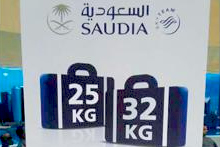 Jeddah, Aug 5: Saudi Arabian Airlines’s recent joining with SkyTeam, a group partnership of 19 airlines world-wide, has left passengers traveling on the Kingdom’s carrier confused over baggage allowances.
Jeddah, Aug 5: Saudi Arabian Airlines’s recent joining with SkyTeam, a group partnership of 19 airlines world-wide, has left passengers traveling on the Kingdom’s carrier confused over baggage allowances.
Saudia had previously allocated a baggage allowance of 32kg per bag for guest class passengers and two 32kg bags for first and business class passengers on international flights.
The baggage allowance was also restricted to 25kg per bag in the domestic sector.
Since then, travel agencies have advised their passengers to carry only one piece of luggage weighing 23 kg, leading to confusion among passengers.
“I am a frequent flyer of Saudia. When I last traveled with them about four months ago, I was allowed to take only one 23-kg bag according to new rules,” said Ahmed Malik.
He pointed out that when his friend traveled just a month ago, he was allowed to carry two pieces of luggage each weighing 25 kg with Zamzam water. “When I booked my seat for travel to the UK, the travel agent told me that I can’t carry more than one 23 kg bag. Confused by that, I visited their website, where I found that guest class passengers can take one bag of 32 kg on international flights to the EU, UK, Middle East, Africa, Asia and the Arabian Gulf.
“Still confused, I approached the Saudia office, where the receptionist told me I can carry 23 kg per bag, even though a poster in the office had 32 kg written on it. For my satisfaction, I went to another officer and he said I could carry 32 kg,” said Malik, who went to a third official and was told that he can carry only up to 27 kg and that he would have to pay extra for anything higher than that.
Another passenger, Tazeen Ishrat, told Arab News that it is unclear how much baggage weight passengers can carry and that many employees at Saudia offices were unaware of the new baggage allowance themselves.
Arab News checked the poster at the Saudia Airlines office, which listed baggage allowance of 32 kg. Arab News also checked the website of the Airline and found that it was 25 kg for domestic passengers and 32 kg on international flights. The website also states that if any piece of luggage weighs in excess of the stated amounts, an excess baggage charge of $100 will have to be paid.
Passenger traveling from Jeddah to London must pay $150 or equivalent for every extra bag they carry, with a maximum of 23 kg per piece that measures 205 centimere in dimension.
Yet an officer from Saudi Arabian Airline’s booking office insists that the airline changed the baggage weight from 32 kg to a maximum of 27 kg per bag per passenger for guest class, adding that first and business class are allowed two pieces and that silver and golden Alfursan members and SkyTeam (Elite Plus/Elite) members would be allowed to carry one extra piece on international flights.






Comments
Add new comment